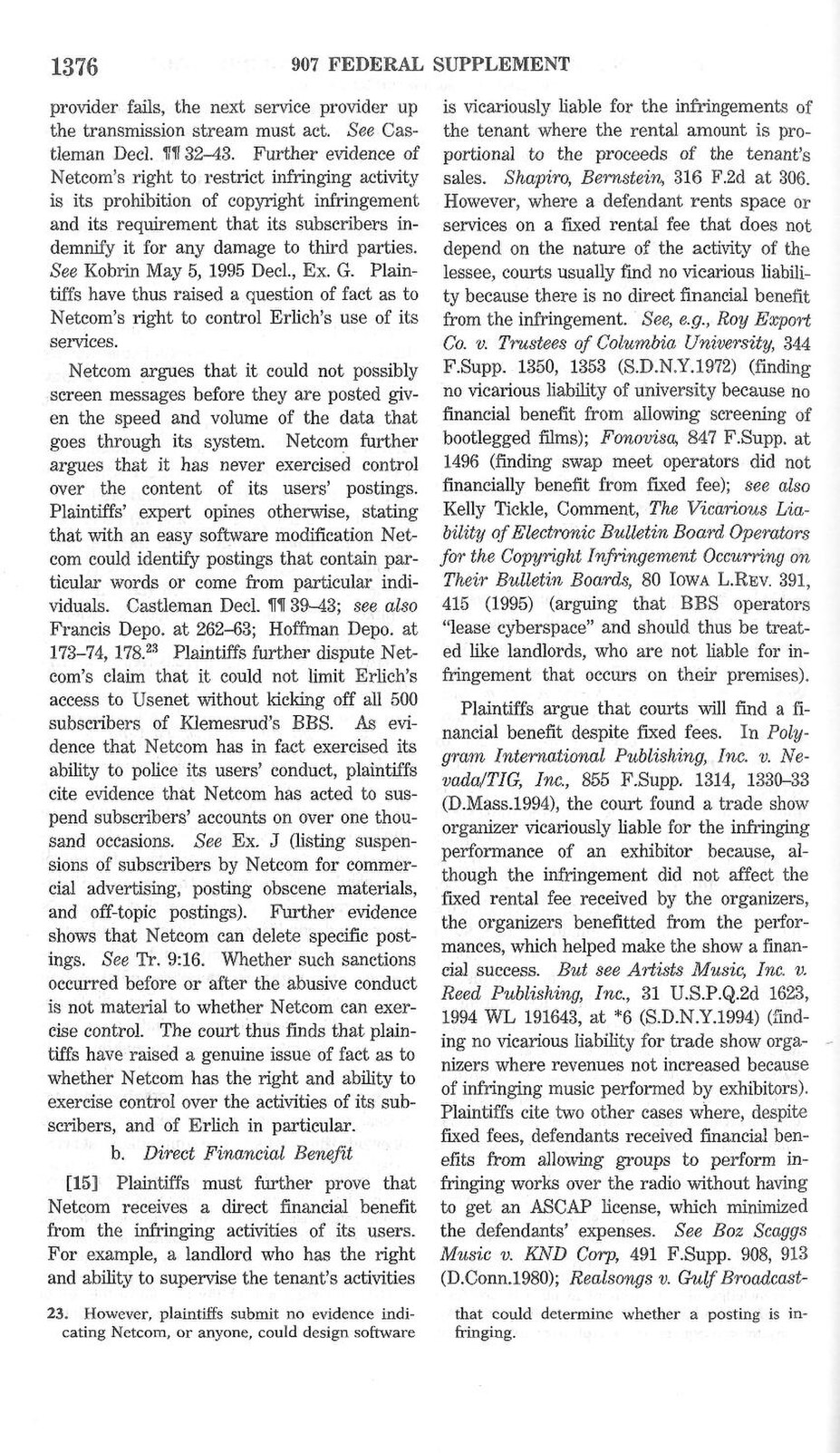provider fails, the next service provider up the transmission stream must act. See Castleman Decl. ¶¶ 32–43. Further evidence of Netcom’s right to restrict infringing activity is its prohibition of copyright infringement and its requirement that its subscribers indemnify it for any damage to third parties. See Kobrin May 5, 1995 Decl., Ex. G. Plaintiffs have thus raised a question of fact as to Netcom’s right to control Erlich’s use of its services.
Netcom argues that it could not possibly screen messages before they are posted given the speed and volume of the data that goes through its system. Netcom further argues that it has never exercised control over the content of its users’ postings. Plaintiffs’ expert opines otherwise, stating that with an easy software modification Netcom could identify postings that contain particular words or come from particular individuals. Castleman Decl. ¶¶ 39–43; see also Francis Depo. at 262–63; Hoffman Depo. at 173–74, 178.[1] Plaintiffs further dispute Netcom’s claim that it could not limit Erlich’s access to Usenet without kicking off all 500 subscribers of Klemesrud’s BBS. As evidence that Netcom has in fact exercised its ability to police its users’ conduct, plaintiffs cite evidence that Netcom has acted to suspend subscribers’ accounts on over one thousand occasions. See Ex. J (listing suspensions of subscribers by Netcom for commercial advertising, posting obscene materials, and off-topic postings). Further evidence shows that Netcom can delete specific postings. See Tr. 9:16. Whether such sanctions occurred before or after the abusive conduct is not material to whether Netcom can exercise control. The court thus finds that plaintiffs have raised a genuine issue of fact as to whether Netcom has the right and ability to exercise control over the activities of its subscribers, and of Erlich in particular.
b. Direct Financial Benefit
Plaintiffs must further prove that Netcom receives a direct financial benefit from the infringing activities of its users. For example, a landlord who has the right and ability to supervise the tenant’s activities is vicariously liable for the infringements of the tenant where the rental amount is proportional to the proceeds of the tenant’s sales. Shapiro, Bernstein, 316 F.2d at 306. However, where a defendant rents space or services on a fixed rental fee that does not depend on the nature of the activity of the lessee, courts usually find no vicarious liability because there is no direct financial benefit from the infringement. See, e.g., Roy Export Co. v. Trustees of Columbia University, 344 F.Supp. 1350, 1353 (S.D.N.Y.1972) (finding no vicarious liability of university because no financial benefit from allowing screening of bootlegged films); Fonovisa, 847 F.Supp. at 1496 (finding swap meet operators did not financially benefit from fixed fee); see also Kelly Tickle, Comment, The Vicarious Liability of Electronic Bulletin Board Operators for the Copyright Infringement Occurring on Their Bulletin Boards, 80 Iowa L.Rev. 391, 415 (1995) (arguing that BBS operators “lease cyberspace” and should thus be treated like landlords, who are not liable for infringement that occurs on their premises).
Plaintiffs argue that courts will find a financial benefit despite fixed fees. In Polygram International Publishing, Inc. v. Nevada/TIG, Inc., 855 F.Supp. 1314, 1330–33 (D.Mass.1994), the court found a trade show organizer vicariously liable for the infringing performance of an exhibitor because, although the infringement did not affect the fixed rental fee received by the organizers, the organizers benefitted from the performances, which helped make the show a financial success. But see Artists Music, Inc. v. Reed Publishing, Inc., 31 U.S.P.Q.2d 1623, 1994 WL 191643, at *6 (S.D.N.Y.1994) (finding no vicarious liability for trade show organizers where revenues not increased because of infringing music performed by exhibitors). Plaintiffs cite two other cases where, despite fixed fees, defendants received financial benefits from allowing groups to perform infringing works over the radio without having to get an ASCAP license, which minimized the defendants’ expenses. See Boz Scaggs Music v. KND Corp., 491 F.Supp. 908, 913 (D.Conn.1980); Realsongs v. Gulf Broadcast-
- ↑ However, plaintiffs submit no evidence indicating Netcom, or anyone, could design software that could determine whether a posting is infringing.
